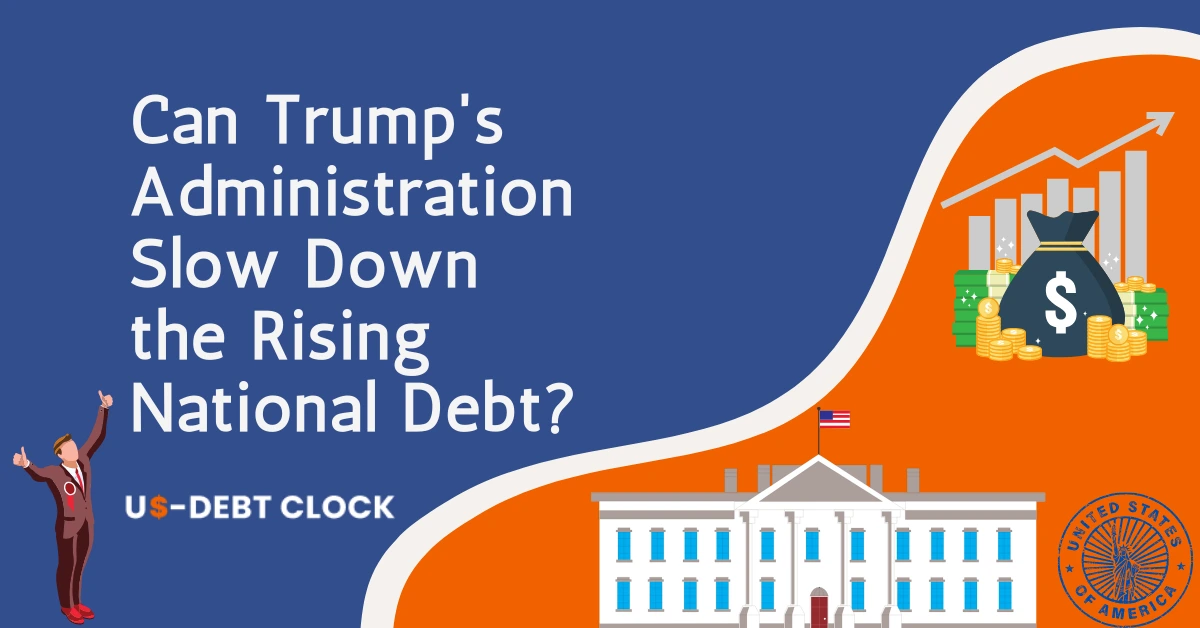The US National Debt has been a very hot topic for discussion and stress for several years as it is surpassing the debt ceiling. Understanding the effects of the debt, especially for future generations, is crucial as it keeps rising. This blog aims to highlight the effects of the US national debt on the well-being and opportunities of future generations, shedding light on its economic burden, reduced economic opportunities, potential solutions, and the importance of financial literacy.
Â
US National Debt and Future Generation
Young Americans are expected to inherit a budget and economy that will leave them in worse financial shape than their parents and less equipped to handle upcoming crises. Our unsustainable fiscal outlook threatens not just our economy but also vital safety net programs that are so important to impoverished Americans, just as climate change and inequality extend substantial threats to our future.
The next generation should be free to decide their destiny, chart their route, and make their own policy decisions without having to continue paying the price for our demands from the past. The idea that we should leave the next generation better off with the financial freedom to choose how to allocate their future resources in the most efficient, democratic, and successful way is the foundation of a fair and ethical America.
Â
Impact of National Debt on Future Generations
Â
Economic Burden and Financial Stability
Â
Expanding Debt and Its Consequences: The current level of the US national debt is staggering, reaching unprecedented levels. Today it already stands at $34Â trillion. But it will rise rapidly in the coming years, expanding to $52 trillion by 2033. Such a significant debt burden can have severe consequences for future generations. Debt growth has an impact on the nation's financial health and raises questions about its long-term capacity to satisfy obligations.
Potential Impact on Interest Rates and Inflation: High levels of national debt can influence interest rates and inflation. The urge to borrow more money as the national debt rises may lead to higher interest rates if the government decides to proceed. The price at which individuals, businesses, and even the government must borrow money is impacted by this. Increased borrowing may also boost inflationary pressures, which might reduce future generations' purchasing power.
Â
Reduced Economic Opportunities
Â
Strains on Government Spending and Budget Allocation: A substantial portion of the federal budget is allocated to debt servicing, leaving fewer resources for vital investments in areas such as education, infrastructure, and healthcare. As future generations rely on these sectors to build a prosperous future, reduced government spending may hinder their access to quality education, modern infrastructure, and adequate healthcare services. Therefore, this can hinder economic development and reduce prospects for the next generations.
Generational Inequality and Social Welfare: The consequences of high national debt can exacerbate generational inequality. The burden of servicing the debt falls on younger generations who will need to shoulder its economic consequences, potentially resulting in a widening wealth gap. Furthermore, social welfare programs may be threatened by high debt levels, lowering the safety net provided to people in need. Future generations may face a more challenging path to social and economic mobility due to limited support systems.
Â
Geopolitical Challenges
High debt not only consumes security-enhancing resources but also limits our options for dealing with hostile states, makes our economy more susceptible to outside influences, and lowers our position and reputation internationally. The proportion of our national revenue and growth that goes to people living overseas rather than to American families increases in direct proportion to the amount of government debt held abroad. We also lose more control over the financial system when more debt is owned by other countries.
The United States has fewer options to use to leverage its assets against other nations as a result of higher debt. Additionally, a greater portion of our national revenue is paid to people and governments abroad due to our high level of debt. Additionally, the fact that America is one of the few wealthy nations without a strategy to organize its finances hurts the country's soft power and position abroad. The United States is more vulnerable to geopolitical dangers than it would be without a high level of debt because we support our goals via borrowing rather than through fiscal restraint.
Â
Risks and Challenges of High National Debt on Future Generation
Numerous threats and difficulties brought on by the US National Debt require consideration. Vulnerability to exogenous shocks and economic downturns is one such risk. A high debt-to-GDP ratio makes recovery more challenging and extends the negative consequences on future generations since it makes the economy vulnerable to disturbances like recessions and financial crises. Another concern is how the national debt affects the value of US currency.
The value of US currency may decline, which has a negative consequence on foreign investments, business, and the nation's economic growth if investors lost faith in the US government's capacity to handle its debt. The strength of the global financial system may be vulnerable to the US National Debt. The US economy is one of the largest in the world, therefore any negative impacts might have a significant worldwide impact and perhaps cause financial instability and unrest.
Â
Potential Solutions and Mitigation Strategies
Â
Fiscal Responsibility and Debt Reduction Measures
Â
Government Policies and Spending Reforms: Addressing the national debt requires responsible fiscal policies. Governments can adopt strategies to reduce spending, increase revenue, and improve budgetary practices. Implementing structural reforms, such as controlling healthcare costs, reforming entitlement programs, and reevaluating defense spending, can contribute to debt reduction and fiscal sustainability. Responsible policies today can alleviate the burden on future generations.
Promoting Economic Growth and Innovation: Fostering economic growth and innovation can play a vital role in reducing the national debt burden. The US may promote economic growth through supporting R&D, fostering entrepreneurship, and making investments in new sectors. A growing economy generates increased revenue, creating a favorable environment for debt reduction and providing future generations with more opportunities for success.
Â
Financial Literacy and Education
Â
Importance of Financial Education: Financial literacy is crucial in understanding and addressing the national debt issue. By promoting financial education, individuals can make informed decisions regarding personal finances, investments, and long-term planning. Educational institutions, government initiatives, and individuals themselves must prioritize financial literacy to navigate economic challenges caused by the national debt effectively.
Preparing Future Generations for Economic Challenges: Equipping future generations with the necessary skills and knowledge is vital. By integrating financial literacy education into school curricula and providing resources for personal finance management, we can prepare young individuals to face economic challenges and make sound financial decisions. Empowering them with financial knowledge will enable them to build a secure future despite the economic hurdles they may encounter.
Â
Conclusion
Future generations will be significantly and in various ways impacted by the US national debt. The economic burden, reduced opportunities, and potential inequalities pose challenges that demand attention and action. Implementing responsible fiscal policies, reducing the debt burden, promoting economic growth, and prioritizing financial literacy can help mitigate these effects and provide future generations with the opportunities they deserve. By staying informed and engaging in discussions about fiscal responsibility and sustainable economic practices, we can collectively work towards securing a prosperous future for generations to come



